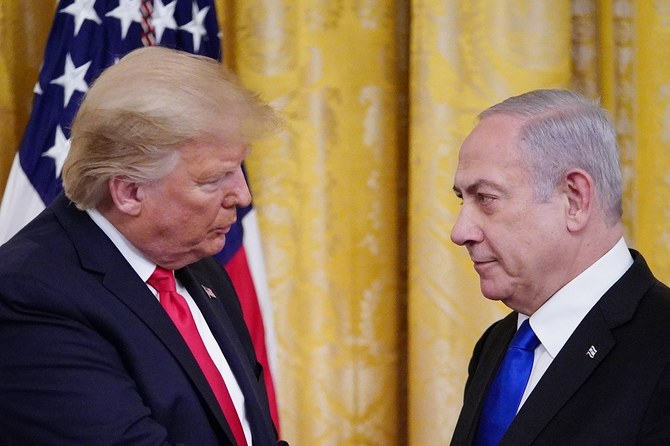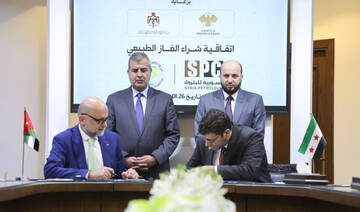BEIRUT: In response to the unveiling of US President Donald Trump’s Middle East peace plan on Tuesday, politicians and activists in Lebanon reiterated their support for the right of Palestinians to return to their homeland, and said they would reject any attempt to permanently resettle refugees on its soil.
Trump’s plan includes billions of dollars of investment in the Palestinian territories and neighboring countries, including Lebanon, which is grappling with an unprecedented economic crisis. Some are worried that the investment might be an inducement to accept the permanent settlement of Palestinian refugees, sparking renewed fears of a shift in the country’s Christian-Muslim balance.
Lebanon hosts 12 refugee camps for Palestinians. A day of protest about the Trump plan was due to take place in the camps on Wednesday, including a general strike, marches and rallies.
Figures from the Lebanese Ministry of Interior reveal that the country hosted almost 600,000 Palestinian refugees between 1948 and 2016. The number registered with The United Nations Relief and Works Agency for Palestine Refugees (UNRWA) is 459,292. A census carried out in 2017 by Lebanon’s Central Statistics Department and the Palestinian Central Bureau of Statistics in 2017 found that 174,422 refugees lives in the camps.
“Lebanon does not currently have any strategy on how to face this difficult moment,” said Hassan Mneimneh, head of the Lebanese–Palestinian Dialogue Committee (LPDC), an inter-ministerial government body.
“The Ministry of Foreign Affairs has not prepared any strategy on how to deal with any attempt to impose resettlement as a fait accompli. We, as Lebanese, must strive to confront this long path because resettlement will not happen overnight, and Lebanon must refuse any trade off between its faltering economic situation and the resettlement issue. There should be no compromise on this matter at all.
“The solutions to the economic crisis must be far removed from the temptations that might be offered to Lebanon in exchange for resettlement.”
Walid Ghayad, a spokesman for the Maronite Catholic Patriarchate in Lebanon, stressed that it “absolutely rejects any attempt to resettle the Palestinians in Lebanon and supports the official Lebanese position, which is enshrined in the constitution.”
He added: “All kinds of deals calling for resettlement are rejected, and (the church) supports the establishment of the two-state solution. It hosted an Islamic-Christian spiritual summit when the US president announced his recognition of Jerusalem as the capital of Israel. Patriarch Bechara Al-Rahi also participated in the Al-Azhar Al-Sharif International Conference on Supporting Jerusalem.”
The leader of the Progressive Socialist Party, Walid Jumblatt, said that Trump’s so-called deal of the century “is the end of the two-state solution and the beginning of the project of displacement to reach an alternative homeland.”
MP Simon Abi Ramia from the Free Patriotic Movement, which opposes any resettlement in Lebanon for fear of upsetting the sectarian balance, described the deal of the century as “the result of a policy of deception adopted by some sister states against the Palestinian issue.”
Ali Faisal, a member of the Political Bureau of the Democratic Front for the Liberation of Palestine, and himself a refugee in Lebanon, said: “A number of Palestinian youths and Palestinian families have migrated from Lebanon to work abroad. There are 160,000 Palestinians working in the Gulf countries, while others migrated in stages to Europe and Canada, and a limited number to Australia.”
He said that there are “fewer than 100,000 Palestinian refugees from Lebanon who are abroad and have another nationality. Those who were removed from the Lebanese records in 2009 as a result of possessing a second nationality began to regain their Palestinian citizenship after efforts made by the Palestinian authorities and the Lebanese state to assert the Palestinian right of return.”
Faisal described Trump’s peace deal as “a political holocaust against the Palestinians and their right of return.”
He added: “The new Palestinian generation is more attached to Palestine than its predecessors. Palestinians (do not want) resettlement, rather they want support to continue (their struggle) to return.
“The economic crisis that Lebanon is experiencing has affected Palestinian refugees, who are already deprived of their human rights. The unemployment rate among Palestinians in Lebanon’s camps has risen from 60 percent to 70 percent. UNRWA’s medical and relief services have declined. What is needed is an emergency plan from UNRWA to help Palestinians survive Lebanon’s economic crisis.”
The Fatah movement in Lebanon announced the “comprehensive mobilization of its ranks” and declared Wednesday a “day of rage” and protest in all Palestinian camps and communities in Lebanon.
Fatah said “it stands behind President Mahmoud Abbas” and vowed to “resist the damned deal by all methods guaranteed by international and humanitarian laws.”
Ayman Shana’a, Lebanese relations officer in the Hamas movement, said that Trump’s plan “is an obituary to all the agreements with the Palestine Liberation Organization and international agreements, as well as the Oslo agreements and international resolutions. The only way to confront this deal lies in Palestinian national unity that stands in the face of all challenges.”
Ihsan Ataya, a representative of the Islamic Jihad movement in Lebanon, said: “Trump is trying to give an electoral boost to Israeli Prime Minister Benjamin Netanyahu. He is throwing out all international resolutions, humanitarian standards and norms, and we will not allow this deal to pass.
“Our people at home and in the diaspora will remain attached to all their rights and will not accept resettlement or displacement...and resistance is ready."
















